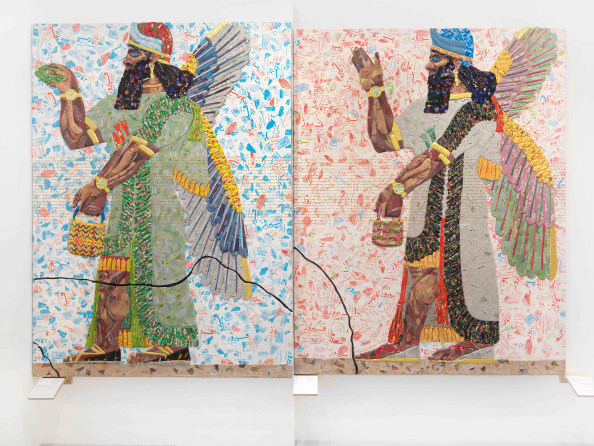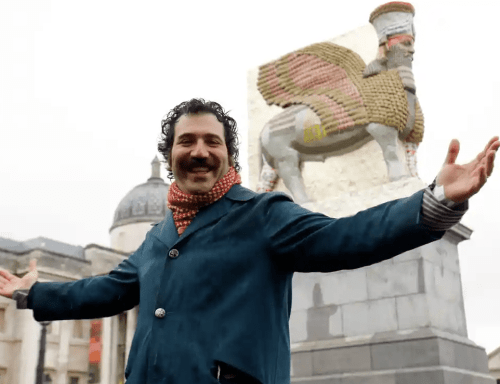

The Iraqi-American artist Michael Rakowitz has proposed in a letter to the British Museum that it return one of its ancient Assyrian treasures to Iraq in exchange for the donation of his fourth plinth sculpture to the UK.
Rakowitz’s contemporary interpretation of an Assyrian winged bull, known as a lamassu, decorated in tins of date syrup, appeared on the plinth in Trafalgar Square from 2018 to 2020.
He has tentatively agreed to gift the sculpture to Tate Modern on the basis that it shares custody with Iraq. But, as part of the deal, he said that the British Museum should return one of its two Assyrian lamassu sculptures, which were discovered in Nineveh by the Victorian archaeologist Sir Austen Henry Layard.
Rakowitz said returning one of these treasures would help replace a 700BC lamassu, which had stood at the Nergal Gate in Nineveh. It was left in place by Layard but deliberately destroyed by Islamic State fighters in a raid on Mosul Museum in 2015. Rakowitz’s proposal is expected to be on the agenda of a visit to London next month by Iraq’s new minister of culture, Ahmed Fakkak, when he is expected to be given a tour of the British Museum.
In a letter to the British Museum, setting out his bargain, Rakowitz said: “As I pondered my gift to the nation of Great Britain, I began to fantasise that it could be attached to a second gift: the return of one of the British Museum’s lamassu to the country of Iraq, to replace what was destroyed by Daesh [or Islamic State]”.
The letter went on: “Given all that has been destroyed in Iraq, and the intersection of that destruction with the west’s insatiable appetite for the objects of the east while not always, if ever, extending that concern to its people, this return of an original would be more than just restitutive. It would be restorative.”
Rakowitz said the British Museum initially dismissed the idea when he first suggested it in 2020. He was told the museum had helped to produce replicas of the originals. Rakowitz said: “I thought to myself, this is fucking insane. Where’s the dignity of sending back these things that are basically a husk of the original.”
But since then other experts at the museum have been more sympathetic, Rakowitz claimed. He said: “I’ve had a generally good relationship with some of the people in the British Museum, who are not ventriloquised by the overall attitude that things can’t go back. The discussions and demands are about breaking through some of the language that protects these objects and institutions.”
Rakowitz said Tate Modern was also lobbying behind the scenes to try to make it happen. He said: “The Tate informally agreed that they would put pressure on the British Museum to return one of the lamassu. The leadership of the Tate was very sympathetic to it.”
When he approached officials in Iraq’s foreign ministry about exhibiting his sculpture, Rakowitz said they were keen to see the ancient lamassu returned to Iraq.
“They loved the lamassu,” he said referring to his work, “but they also didn’t want to let the United Kingdom off the hook, and that they wanted the real ones back. London now have one lamassu too many so one of them needs to go back to Iraq.”
Eleanor Robson, a professor of ancient Middle Eastern history at University College London, said the British Museum appeared to be softening its stance on returning treasures to the country of their origin, amid discussions about the future of Parthenon marbles. “The mood music seems to be changing,” she said.
Robson, who is also chief investigator at the Nahrein Network on post-conflict cultural recovery in Iraq and the host’s of Fakkak visit, said: “The refurbishment of Mosul museum is very high on his agenda – it was very badly damaged by Daesh. There’s a lot of planning about what might go inside it. One possibility is that Michael’s lamassu might come and visit. It will be for the minister to decide.”
It is unclear whether the minister will press for the original lamassu to be returned to Iraq.
Robson added: “It’s good that we’ve got people like Michael, coming to stir things up and getting the debate going.”
The British Museum would not commit to handing back either of its lamussu to Iraq, but did not rule out loan deals. A spokesperson said: “We were closely involved in supporting Iraqi requests for replica lamassu for the exterior of the university library in Mosul and, more recently, the Basrah Museum, where we have been working in partnership for over a decade. Future collaborations may well include cooperation on exhibitions and loans, which the museum would welcome.”